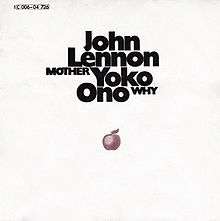Mother (John Lennon song)
| "Mother" | ||||
|---|---|---|---|---|
 | ||||
| Single by John Lennon | ||||
| from the album John Lennon/Plastic Ono Band | ||||
| B-side | "Why" (Yoko Ono) | |||
| Released | 28 December 1970 (US only) | |||
| Format | 7" vinyl | |||
| Recorded | September–October 1970 | |||
| Length |
5:34 (album version) 3:53 (single edit) 3:50 (demo version) | |||
| Songwriter(s) | John Lennon | |||
| Producer(s) | Phil Spector, John Lennon and Yoko Ono | |||
| John Lennon singles chronology | ||||
| ||||
| John Lennon/Plastic Ono Band track listing | ||||
|
11 tracks
| ||||
"Mother" is a song by English musician John Lennon, first released on his 1970 album John Lennon/Plastic Ono Band. An edited version of the song was issued as a single in the United States on Apple Records, on 28 December 1970.[1] The single runs about 1:41 shorter than the album due to a lack of the tolling bells intro and a quicker fadeout. The B-side features "Why" by Yoko Ono. The song peaked in the United States at number 19 on the Cashbox Top 100[2] and number 43 on the Billboard Hot 100.[2]
Conception
The lyrics of "Mother" address both of Lennon's parents, each of whom abandoned him in his childhood. His father, Alf, left the family when John was an infant. His mother, Julia, did not live with her son, although they had a good relationship; she was hit and killed in a car accident on 15 July 1958 by a drunk off-duty policeman named Eric Clague, when Lennon was 17. In one of his last concerts Lennon stated that the song was not just about his parents, but was rather "about 99% of the parents, alive or half dead".
"Mother" opens the album, starting with a funeral bell tolling slowly, four times. The song ends with Lennon initially singing the phrase "Mama don't go, daddy come home", but then screaming as the song fades out.
Lennon was inspired to write the song after undergoing primal therapy with Arthur Janov, originally at their home at Tittenhurst Park and then at the Primal Institute, California, where they remained for four months. Lennon, who eventually derided Janov, initially described the therapy as "something more important to me than The Beatles".[3]
Although Lennon said that "Mother" was the song that "seemed to catch in my head", he had doubts about its commercial appeal and he considered issuing "Love" as a single instead.[4] In November 1982, a remixed version of "Love" was released as a single to help promote The John Lennon Collection LP.[5]
An early version of "Mother" performed on an electric guitar by Lennon can be heard on the John Lennon Anthology box set.[6]
A demo version of the song was featured in the final scene and credits of the 2009 film Nowhere Boy.[7]
Other versions
Barbra Streisand recorded "Mother" (as well as Lennon's "Love") on her 1971 album Barbra Joan Streisand;[8] it was also released as a single. The song also featured on Lennon's live album Live in New York City, released by Yoko Ono after his death. Other songs born out of this period of therapy include "Working Class Hero" and "Isolation". Shigesato Itoi, creator of the Mother video game series, stated in an interview that this song was in large part the inspiration for his naming of the series. Mia Martini recorded in 1972 this song in Italian, with the title literally translated as "Madre". Maynard Ferguson recorded the song on his 1972 album M.F. Horn Two. South African artist Ratau Mike Makhalemele covered the song on an EP of Lennon covers in 1990.[9] Shelby Lynne covered this song for her 2001 album Love, Shelby. Christina Aguilera covered the song in 2007 for the benefit album Instant Karma: The Amnesty International Campaign to Save Darfur, and Emmanuel Jal's version was available on that album as an iTunes exclusive bonus track. Eminem also used the beat for his "Headlights" song off the Marshall Mathers LP 2. Folk artist, Jackie Oates, included a version of the song on her album The Joy of Living in 2018.
Personnel
The musicians who performed on the original recording were as follows:[10]
- John Lennon – double-tracked vocals, piano
- Ringo Starr – drums
- Klaus Voormann – bass guitar
Lennon plays guitar rather than piano on the Nowhere Boy demo version.[7]
Additional notes
- "Mother" serves as the theme song for the FX series Better Things.
References
- ↑ Miles, Barry; Badman, Keith, eds. (2001). The Beatles Diary After the Break-Up: 1970-2001 (reprint ed.). London: Music Sales Group. ISBN 9780711983076.
- 1 2 Blaney, John (2005). John Lennon: Listen to This Book (illustrated ed.). [S.l.]: Paper Jukebox. p. 326. ISBN 978-0-9544528-1-0.
- ↑ Coleman, Ray (1984). Lennon: The Definitive Biography. Pan Publishing.
- ↑ Wenner, Jann (1971). Lennon Remembers. Straight Arrow Press.
- ↑ Madinger, Chip; Easter, Mark (2000). Eight Arms to Hold You: The Solo Beatles Compendium. Chesterfield, MO: 44.1 Productions. pp. 38–39, 576. ISBN 0-615-11724-4.
- ↑ "Mother". The Beatles Bible. 2 August 2010. Retrieved 20 July 2017.
- 1 2 "'Isn't he a bit like you and me'?". Filmycks.com. Retrieved 2016-10-03.
- ↑ William Ruhlmann. "Barbra Joan Streisand - Barbra Streisand | Songs, Reviews, Credits". AllMusic. Retrieved 2016-10-03.
- ↑ Brian Currin. "Mike Makhalemele - Mind Games". Rock.co.za. Retrieved 2016-10-03.
- ↑ Blaney, John (2005). John Lennon: Listen To This Book. Guildford, Great Britain: Biddles Ltd. p. 57. ISBN 0-9544528-1-X.